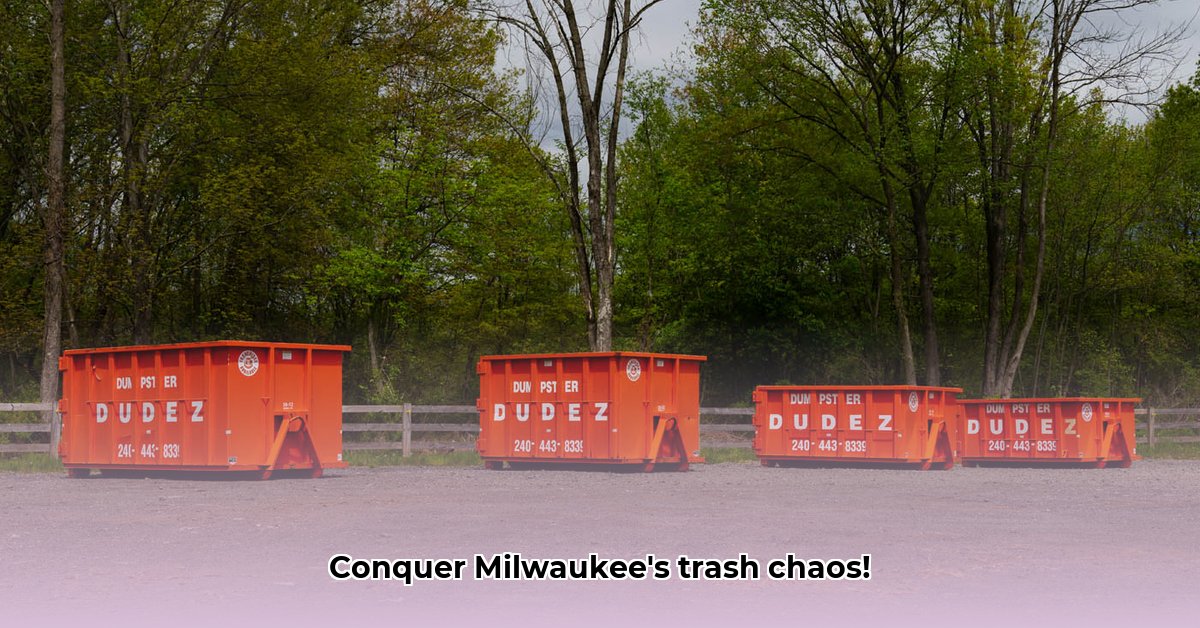# Milwaukee Waste Management: Your Comprehensive Guide to Trash, Recycling, and More
Navigating Milwaukee's waste disposal system can feel overwhelming. Whether you're a new resident or a long-time homeowner, this guide simplifies everything you need to know about trash, recycling, and composting. We'll provide practical tips for efficient waste management, explore ways to minimize your environmental footprint, and ensure you're contributing to a cleaner, greener Milwaukee.
## Understanding Milwaukee's Waste Collection Services
Milwaukee provides a range of waste management services to its residents, including garbage collection, recycling programs, yard waste disposal, and options for handling bulky items. To fully leverage these services, it's essential to understand the specific guidelines and schedules applicable to your property.
### Discovering Your Collection Schedule: Location Matters
Your waste collection schedule depends on your specific address. A single-family home in Riverwest will likely have a different schedule than a condo in the Third Ward. To find your personalized schedule, visit the City of Milwaukee Department of Public Works (DPW) website or contact their customer service. Confirm your address to access your collection calendar, which details garbage, recycling, and yard waste pickup days.
Many areas offer weekly garbage and recycling collection, while yard waste collection may be seasonal. Mark these dates on your calendar or set reminders to ensure you never miss a pickup. Subscribing to email or text alerts from the city can also help you stay informed about schedule changes due to holidays or unforeseen circumstances.
### Waste Sorting Made Simple: A Guide to What Goes Where
Efficient waste management begins with proper sorting. Separating your trash correctly optimizes landfill space and streamlines the recycling process. Follow these steps:
**Step 1: Garbage (Non-Recyclable Waste):**
This bin is for items that cannot be recycled, such as food scraps (unless composting), soiled paper products, and non-recyclable plastics. Always bag your garbage securely to prevent spills and odors.
**Step 2: Recycling (Recyclable Materials):**
Place items that can be reused or reprocessed into new products in this bin. Common recyclables include:
* Plastic bottles and jugs (typically #1 and #2 plastics)
* Aluminum cans
* Glass bottles and jars
* Paper products such as newspapers, magazines, and flattened cardboard
Rinse food residue from containers before recycling. Note that some items, like greasy pizza boxes or certain types of plastic, are not recyclable in Milwaukee. Always consult the city's guidelines for clarification.
**Step 3: Yard Waste (Seasonal):**
Grass clippings, leaves, and small branches are typically collected separately during designated periods. Use approved containers or compostable bags for yard waste. Bundle larger branches securely. Check with your waste collection service for specific guidelines.
### What to Do When Pickups Are Missed
A missed garbage or recycling pickup can be frustrating. Follow these steps to resolve the issue:
1. **Verify Your Schedule:**
Double-check your collection schedule online or on the city's app to ensure you didn't overlook the correct day.
2. **Report the Missed Pickup:**
If a pickup was genuinely missed, report it promptly via the city's online service request system or by calling the DPW. Provide your address and any relevant details.
3. **Be Patient:**
Keep in mind that collection schedules can be affected by holidays and inclement weather. Monitor the city's website or social media channels for updates on delays or service disruptions.
### A Quick Guide to Recycling Acceptability
Refer to the following table for a quick reference on acceptable and unacceptable recycling materials. Always consult the City of Milwaukee's waste management website for the most up-to-date information.
| Material Category | Acceptable Items | Unacceptable Items |
| :---------------- | :------------------------------------------------------------------------------------------------------------------- | :------------------------------------------------------------------------------ |
| Plastics | Bottles and jugs (marked #1 and #2) - Ensure they are clean and empty. | Plastic bags, plastic film, polystyrene foam (Styrofoam), clamshell containers |
| Glass | Bottles and jars (clear, green, and brown) - Rinse and remove lids. | Ceramics, light bulbs, window glass, mirrors |
| Aluminum | Cans - Empty and rinse. | Aluminum foil (especially if soiled), scrap metal |
| Paper | Newspapers, magazines, cardboard (flattened), junk mail (remove plastic inserts) - Keep dry and clean. | Greasy pizza boxes, tissues, paper towels, waxed paper |
| Cardboard | Corrugated cardboard boxes (flattened) - Remove any packaging materials inside. | Waxed cardboard, soiled cardboard |
### Disposing of Bulky Waste and Appliances
Large items like furniture, appliances, and mattresses require special handling. Do not place them on the curb for regular collection. Instead, contact your waste management provider to schedule a bulky waste pickup. Fees may apply, and there may be restrictions on the types of items accepted.
Some charitable organizations also accept donations of gently used furniture and appliances. Consider this option to give your unwanted items a second life and support your community.
### FAQs: Addressing Your Questions About Milwaukee's Waste Management Policies
* **Q: What should I do if my bins are too small?** A: Contact the city to request larger bins.
* **Q: How do I dispose of batteries and electronics?** A: These items require special handling due to their hazardous components. Check the city's website for designated drop-off locations or collection events.
* **Q: Can I recycle plastic bags?** A: No, plastic bags are generally not recyclable in Milwaukee's curbside program. Many grocery stores offer plastic bag recycling drop-off locations.
* **Q: How do I dispose of paint and chemicals?** A: These are considered household hazardous waste and should be taken to a designated collection site.
## Reducing Household Waste in Milwaukee: Practical Strategies
### Understand Milwaukee's Waste Management System
Milwaukee employs a comprehensive waste management approach that includes curbside recycling, designated hazardous waste disposal sites, and a focus on community involvement. Residents play a crucial role in the success of these programs.
### A Step-wise Approach to Waste Reduction
1. **Reduce, Reuse, Recycle**: Prioritize these three principles. Before discarding an item, ask if its use can be reduced, if it can be repurposed, or if it can be recycled.
2. **Master the Milwaukee Recycling Guide**: Familiarize yourself with the city's list of accepted recyclable materials.
3. **Embrace Composting**: Compost food scraps and yard waste to significantly reduce the amount of waste sent to landfills.
4. **Avoid Single-Use Plastics**: Opt for reusable alternatives to single-use plastic items such as bags, water bottles, and coffee cups.
5. **Sort Waste Properly**: Make waste sorting a regular habit to prevent contamination and ensure efficient processing.
6. **Pay Attention to Weight Limits**: Be aware of weight limits on garbage carts to avoid additional costs; doing so promotes efficiency.
### The City's Stance on Waste Reduction Goals
Milwaukee aims for a 50% recycling rate. Active resident involvement is essential to achieving this goal. By adopting responsible waste management practices, Milwaukee residents can contribute to a cleaner, greener future.
Latest posts by Mark Soldy (see all)
- Glass Wall Tiles For Bathroom: A Stylish, Durable Choice - December 10, 2025
- Glass Mosaic Kitchen Backsplash: Add Shimmer and Style - December 9, 2025
- Glass Mosaic Backsplash: A Stylish Upgrade For Your Kitchen - December 8, 2025









